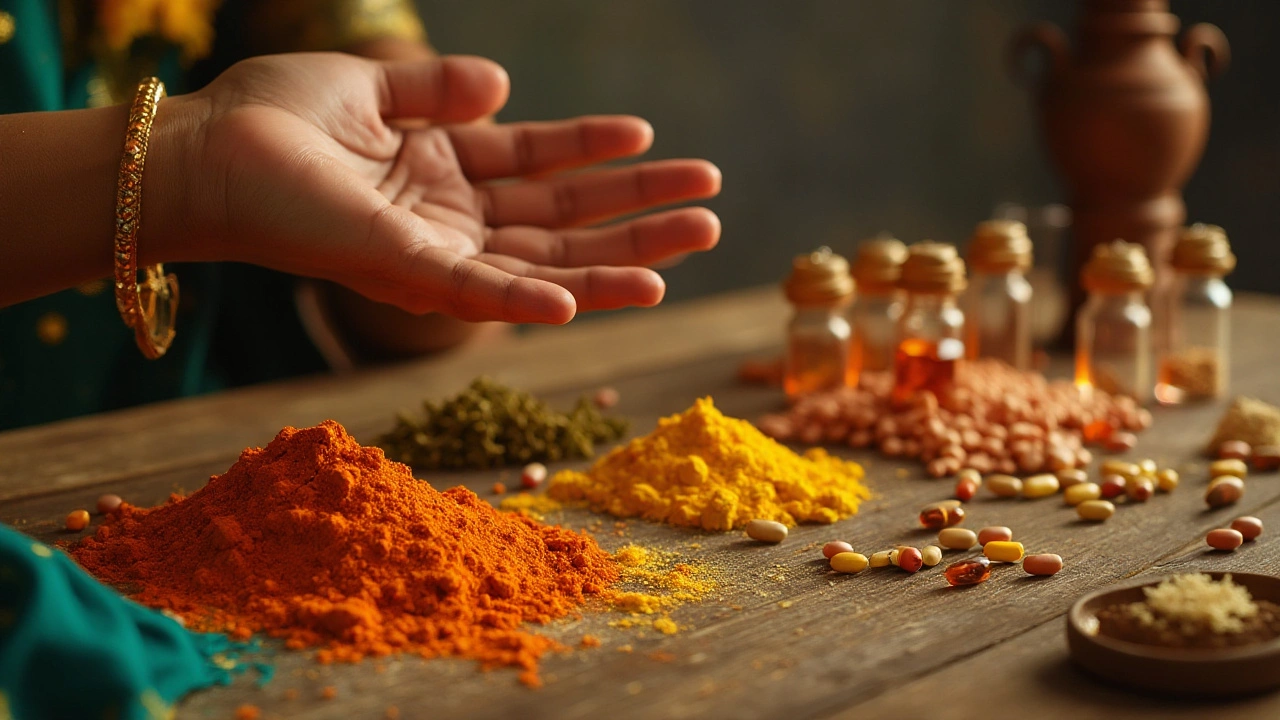When diving into the world of natural healing, it’s vital to recognize the nuances that accompany using homeopathic medicine alongside other natural treatments like Ayurveda. While both practices aim to restore balance and promote wellness, mixing them without proper guidance can sometimes lead to unintended consequences.
In this article, we will explore some common pitfalls that folks might encounter when combining these two holistic approaches. Highlighting what should not be taken with homeopathic remedies is key for those who wish to harness their full potential safely. With a little guidance, you can make informed decisions about your natural treatment plans, ensuring that your journey to health remains smooth and effective.
- Understanding Homeopathic Remedies
- Key Dietary Considerations
- Common Ayurvedic Ingredients to Avoid
- Consulting with Healthcare Professionals
Understanding Homeopathic Remedies
Homeopathy is a distinct form of medicine that dates back to the 18th century, articulated by Samuel Hahnemann. It operates on principles that are quite different from conventional medicine, and it uses a holistic approach to treat illnesses. The core idea is the 'law of similars', which suggests that like cures like. This concept means that a substance that causes symptoms in a healthy person can be used to treat similar symptoms in a sick person when administered in highly diluted form. Homeopathic remedies are derived from a variety of natural sources, including plants, minerals, and animals. These substances undergo potentization, a process of serial dilution and succussion to enhance the energy and healing properties while minimizing toxicity.
The appeal of homeopathic treatments lies in their individualized approach and minimal side effects. Practitioners consider not just the symptoms, but the whole person, including emotional and psychological patterns. It's intriguing how two patients with the same symptoms might receive entirely different treatments in homeopathy, underscoring its personalized nature. The remedies come in various forms such as tablets, pills, liquids, or creams, and are chosen based on a comprehensive analysis of the patient's overall health and well-being. According to The British Journal of Clinical Pharmacology, “The personalized healthcare model embraced by homeopathy can offer rich insights into patient-centric solutions.”
One of the fascinating aspects of homeopathic medicine is the belief in stimulating the body's own healing mechanisms, which stands in contrast to conventional treatments that often focus on directly fighting diseases. Practitioners suggest that even when taken in minute doses, these remedies provide energetic imprints that trigger healing responses. It’s interesting to note that the effectiveness of homeopathy is a topic of extensive debate within the scientific community. Despite the skepticism, millions around the world continue to seek homeopathic care, often citing positive personal experiences. For individuals drawn to natural treatments, homeopathy can offer a gentle alternative, especially for chronic conditions where traditional medicine hasn't been satisfactory.
Adherents to homeopathy emphasize the importance of holistic health, advocating for lifestyle adjustments that align with treatment goals. Diet, exercise, and stress management are common points of focus, as they can significantly influence treatment outcomes. The efficacy of these remedies can be markedly influenced by individual habits such as caffeine consumption, smoking, and even diet. Thus, understanding what should not be taken or done when on homeopathic medicine can be crucial for those looking to optimize their health journey. A comprehensive approach would usually involve consultation with certified practitioners who can guide based on specific needs and conditions. The experience and intuition of a seasoned homeopath could add dimensions to treatment outcomes that generic prescriptions cannot match.

Key Dietary Considerations
When incorporating homeopathic medicine into your health regimen, understanding the dietary considerations becomes crucial in ensuring its effectiveness. Keeping certain foods and beverages out of your diet can make a significant difference in how well these remedies work. The most impactful substances that tend to interfere with the efficacy of homeopathic treatments are highly aromatic spices and substances, such as menthol and camphor. Foods like peppermint, garlic, onion, and coffee should be consumed mindfully, as their strong aromas can potentially negate or diminish the impact of homeopathic remedies. This is a classic point stressed by practitioners since the inception of homeopathy.
According to a principle followed by homeopaths, the palate should avoid any strong-tasting items around the time of taking the remedy. Take, for example, coffee, an everyday indulgence for many. While debates still ignite among practitioners about its true impact, traditional wisdom suggests steering clear of coffee before and after doses. This hesitation is grounded in the belief that coffee can distort the body's energy resonance, thereby altering the medicine's effectiveness. To illustrate how rooted this practice is, many cite Samuel Hahnemann, the father of homeopathy, as having advocated for a clean diet to maximize treatment outcomes.
"It is essential that the patient maintains a consistent approach to their health, carefully avoiding any strong or aromatic food items that may affect the remedy", remarks Dr. Jane Winter, an expert in integrative medicine.
The Role of Sugar and Artificial Additives
Another common recommendation is to be mindful of sugar intake, particularly when consuming artificial additives. Processed sugars and sweeteners present in various food products can alter your body's natural balance and rhythm. Although sugar itself isn't directly antagonistic to homeopathic treatments, the processed variants can disrupt internal harmony. Moreover, sweeteners and artificial additives, often found in packaged foods, may leave subtle trails of chemicals that could interact unfavorably with the medicine's healing properties.
While the impact varies from person to person, staying hydrated and choosing foods with minimal processing can aid in maintaining a more receptive environment for these natural treatments. Opt for wholesome, fresh, and organic options when possible. Embrace a diet filled with ample vegetables, whole grains, and lean proteins, as these elements typically harmonize well with both homeopathic and Ayurvedic philosophies. The collective wisdom across both systems emphasizes the importance of aligning the body, mind, and environment for holistic healing. Thus, keeping your diet clean and balanced effectively supports the transformative journey afforded by these remedies.

Common Ayurvedic Ingredients to Avoid
Venturing into the synergy of homeopathic medicine and Ayurveda unfolds a path rich with promise and potential, but it can be dotted with certain incongruities. Not all Ayurvedic ingredients harmonize well with homeopathic remedies, and being aware of these can help you navigate this course smoothly. For starters, one should tread cautiously with strong stimulants such as ashwagandha, which is revered in Ayurveda for its adaptogenic properties. While it’s celebrated for enhancing vitality and reducing stress, this potent herb can sometimes clash with the subtle energies leveraged in homeopathy. The premise of ashwagandha’s dynamism can potentially interfere with the finely-tuned frequencies of homeopathic treatments, leading to diminished efficacy.
Another commonly lauded Ayurvedic ingredient is turmeric, hailed for its anti-inflammatory and antioxidant prowess. While turmeric’s earthy richness bestows numerous benefits, its bioactive compounds, particularly curcumin, may overpower certain homeopathic potencies. This doesn’t imply that turmeric or curcumin should never be consumed, but rather suggests a mindful approach when these ingredients are considered alongside homeopathic options.
Moreover, Ayurveda's arsenal includes strong detoxifying agents such as triphala. Comprising three fruits, each with its distinct quality, triphala is a cornerstone for gut health in Ayurveda. Its cleansing nature, though beneficial, can pose challenges when combined with homeopathic tinctures targeting similar bodily systems, as they might end up leading to excessive detoxification. Keeping an eye on ingredients like guggul, a resin used for its circulatory benefits, is equally essential. Known for its blood-thinning properties, guggul can conflict with remedies focusing on blood coagulation issues, muddling the intended outcomes of your holistic strategy.
"The universe of natural treatment is abundant, yet we must tread carefully to avoid our remedies counteracting each other." - Dr. Shalini Sharma, Ayurvedic Practitioner and Herbalist
The realm of Ayurvedic oils, including sesame and mustard oils, should not be overlooked either. While these are crucial in Ayurvedic massages and treatments due to their nourishing qualities, they can sometimes introduce a complexity when administered concurrently with homeopathic medicines targeting skin or muscular concerns. It's always prudent to consider the intrinsic qualities of each and their intended pathways of healing.
To aid in understanding these nuances, incorporating a phased approach can be beneficial. Here is a quick checklist to consider:
- Identify the active ingredients in both the homeopathic and Ayurvedic substances you are considering.
- Research their interactions or consult with a trained practitioner who is proficient in combining these modalities.
- Monitor any changes in your symptomatology post-consumption to gauge incompatibilities early on.

Consulting with Healthcare Professionals
Navigating the intricate world of natural healing calls for expert guidance, especially when mixing different forms of alternative medicine like homeopathic medicine and ayurvedic remedies. Consulting with healthcare professionals, who have a keen understanding of both practices, ensures a safer and more effective approach. These professionals bring a wealth of knowledge not just from textbooks but also from their experience treating patients with these traditional methods. This dialogue with a healthcare expert is crucial as they can identify potential interactions between the myriad ingredients found in homeopathic and Ayurvedic treatments.
There might be moments when you find yourself inclined to follow advice based on anecdotal evidence from friends or family. While personal stories can be encouraging, they might not always apply to your unique health situation. Getting insights from an expert helps to avoid missteps that might otherwise hinder the healing process. An open and honest conversation about your current medications, health history, and lifestyle can lead to tailored advice. A healthcare professional will consider factors unique to your body’s needs and biochemistry, ensuring that the natural treatments do not inadvertently counteract each other or interfere with your health goals.
Interestingly, a study published in the Journal of Alternative and Complementary Medicine highlighted how over 60% of individuals reported feeling more positive about integrating natural remedies after consulting with a professional. This study underscores the psychological benefits that come from knowing you’re on the right track, which is an often overlooked aspect of healing. Besides, they offer a space to ask all those burning questions and, crucially, receive evidence-based answers.
"A holistic approach looks at a person's entire lifestyle when treating their symptoms. Only a fully informed practitioner can balance this equation," says Dr. Samantha Close, a renowned specialist in integrative medicine.
While much of modern medicine emphasizes testing and quantifiable results, the holistic field leverages traditional knowledge and an intimate understanding of natural substances. Healthcare professionals can utilize this wisdom to create a plan that blends natural treatments effectively. To make the consultation more effective, it's wise to come prepared with a list of all supplements or remedies you are currently taking. Keeping a symptoms diary can also help the practitioner diagnose and recommend adjustments more accurately.
| Consultation Benefit | Description |
|---|---|
| Insightful Guidance | Healthcare professionals offer insights based on both traditional and modern medical knowledge. |
| Risk Identification | Experts help in pinpointing potential drug-nature remedy interactions. |
| Personalized Advice | Recommendations are tailored to your individual health status and needs. |
| Improved Outcomes | Increases the likelihood of a successful healing process by avoiding common pitfalls. |
Consulting with healthcare professionals may at first seem like a tedious step, but this partnership can be invaluable. Homeopathy and Ayurveda, while individually potent, can have compounded benefits when carefully curated together, and professional counsel is your bridge to achieving this balance. They ensure that your journey into the realm of natural healing is both safe and rewarding, granting peace of mind and potentially transforming your approach to health and well-being.






